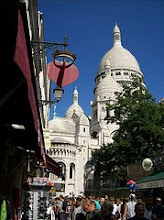I got busy and let a couple of weeks lapse, but I still wanted to post a review of the Dengue Fever documentary I attended in Hollywood because it turned out to be very worthwhile. The screening was sponsored by Amoeba Music and was held at Space 15 Twenty, a new outdoor shopping area just off of Sunset Blvd. It was a bit chilly to sit outside for almost two hours to view a film but I am still glad I went. Dengue Fever was formed in Los Angeles in 2001 by brothers Zac and Ethan Holtzman. They both got serendipitously inspired around the same time by Cambodian pop music of the 1960’s and ‘70’s and went on a search for a singer, finding an established one in Chhom Nimol, a Cambodian immigrant to Long Beach, CA. The documentary, Sleepwalking Through the Mekong, chronicles the band’s tour of her home country. Dengue Fever is the first American rock band to tour Cambodia, and the film includes their performances in Phnom Penh, their appearance on Cambodian television, and their trip to the rural countryside to perform both in a children’s music education program and on a makeshift stage set up in a slum. The band made no money on this tour because Cambodia is a poor nation with persistent third-world conditions, and they had to turn to their record label to provide part of the financing for the trip. In interview segments interspersed through the film, the musicians said they had wanted to make the journey in order to explore the source of the music they found so compelling and to give something back to those who had inspired them. The film is eye-opening in chronicling the lasting effects of the Khmer Rouge dictatorship on the Cambodian populace and their culture. Many of the original artists that Dengue Fever references in their own music were killed in a cultural purge ordered by Pol Pot, the architect of the Khmer. He installed a state radio station which played only his own propaganda songs, and folk and pop songs were outlawed as they could be used to undermine his authority. It’s clear that, despite his efforts at control, they lived on in the underground - when Dengue Fever played some of the older tunes, entire audiences sang along with every word. The children at the school the band visited also were well-acquainted with the music thanks to the determined efforts of their teacher, an admirable woman who spoke of her own childhood sadly interrupted by war. The Cambodian artists of that era had originally been inspired by rock and rock from the U.S., so it was very interesting to watch the cross-pollination come full-circle over the course of events highlighted in this documentary. Some of my favorite parts of the film showcased the interaction between the Western members of the band and people they encountered in Cambodia. In one scene in an open-air market, the band good-naturedly socializes with vendors, and a dinner with the lead singer’s family is also entertaining. But I was most taken with the scenes that documented the band setting up and performing in a shantytown. The local children hung on the stage and watched them as though they were gods descended to earth and an enormous crowd massed to view the spectacle. It made a lasting impression on me to be reminded how impoverished much of the world remains, and it made me more consciously grateful to live as I do in such a culturally rich and diverse environment as Los Angeles.
I recommend Sleepwalking Through the Mekong for music fans, devotees of Asian pop culture and anyone interested in cultural history in general. There is a very nice website for the film at the following address for anyone who would like more info:
http://www.sleepwalkingthroughthemekong.com/
Wednesday, April 15, 2009
Subscribe to:
Post Comments (Atom)






No comments:
Post a Comment